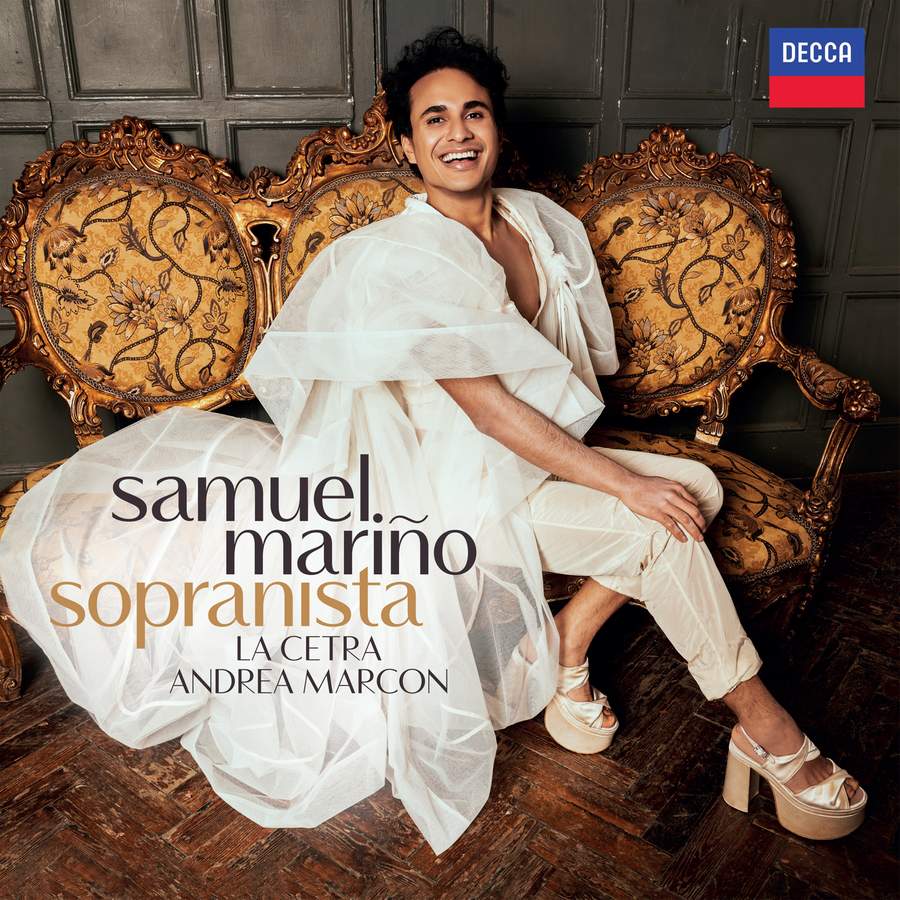Samuel Mariño: Sopranista
View record and artist detailsRecord and Artist Details
Genre:
Opera
Label: Decca
Magazine Review Date: 08/2022
Media Format: CD or Download
Media Runtime: 59
Mastering:
DDD
Catalogue Number: 485 2943

Tracks:
| Composition | Artist Credit |
|---|---|
| (Le) nozze di Figaro, '(The) Marriage of Figaro', Movement: Voi che sapete |
Wolfgang Amadeus Mozart, Composer
Andrea Marcon, Conductor La Cetra Baroque Orchestra Samuel Mariño, Soprano |
| Orfeo ed Euridice, Movement: Che faro' senza Euridice? |
Christoph Gluck, Composer
Andrea Marcon, Conductor La Cetra Baroque Orchestra Samuel Mariño, Soprano |
| (Il) re pastore, '(The) Shepherd King', Movement: ~ |
Wolfgang Amadeus Mozart, Composer
Andrea Marcon, Conductor La Cetra Baroque Orchestra Samuel Mariño, Soprano |
| (Il) re pastore, '(The) Shepherd King', Movement: L'amerò, sarò costante |
Wolfgang Amadeus Mozart, Composer
Andrea Marcon, Conductor La Cetra Baroque Orchestra Samuel Mariño, Soprano |
| Resta in pace, idolo mio |
Domenico Cimarosa, Composer
Andrea Marcon, Conductor La Cetra Baroque Orchestra Samuel Mariño, Soprano |
| (La) Clemenza di Tito, Movement: Deh per questo istante |
Wolfgang Amadeus Mozart, Composer
Andrea Marcon, Conductor La Cetra Baroque Orchestra Samuel Mariño, Soprano |
| L'amant anonyme, Movement: Ouverture |
Joseph Boulogne Saint-Georges, Composer
Andrea Marcon, Conductor La Cetra Baroque Orchestra |
| L'amant anonyme, Movement: Son amour, sa constance extreme |
Joseph Boulogne Saint-Georges, Composer
Andrea Marcon, Conductor La Cetra Baroque Orchestra Samuel Mariño, Soprano |
| L'amant anonyme, Movement: Enfin une foule importune… Amour deviant moi propice |
Joseph Boulogne Saint-Georges, Composer
Andrea Marcon, Conductor La Cetra Baroque Orchestra Samuel Mariño, Soprano |
| Mitridate, Re di Ponto, Movement: ~ |
Wolfgang Amadeus Mozart, Composer
Andrea Marcon, Conductor La Cetra Baroque Orchestra Samuel Mariño, Soprano |
| Oreste, Movement: Cara parte del mio cor |
Domenico Cimarosa, Composer
Andrea Marcon, Conductor La Cetra Baroque Orchestra Samuel Mariño, Soprano |
Author: Alexandra Coghlan
Samuel Mariño is a true male soprano: his chest voice goes all the way up (and up and up – listen out for the top E flat). After an early career obediently following the baroque countertenor path, the young Venezuelan has now donned high heels (see album cover) and stepped decisively out in a new direction, determined to showcase a voice he has described as ‘a light lyric soprano with a bit of coloratura’ in repertoire that defies traditional expectations of gender.
The result is ‘Sopranista’ – the singer’s first release with Decca, and quite a departure from his much more traditional solo debut ‘Care pupille’ (Orfeo, 8/20). There’s a lot of talk about historical rarities and opportunities in the booklet essay, but beyond one aria from Cimarosa’s Oreste and another from Saint-Georges’s L’amant anonyme (both premiere recordings, neither earth-shattering), this is all pretty familiar stuff, mostly by Mozart. The novelty here is a male singer claiming both castrato and soprano roles, both male and female, from Saint-Georges’s Léontine to Mozart’s Aminta, Sesto and Cherubino.
Barbara Bonney protégé Mariño certainly has a distinctive instrument that will delight fans of the Jaroussky school of hyper-pure, boyish countertenors. Imagine a really excellent boy treble with better technique, flawless high notes and nothing at all below the stave, and you have Mariño. His coloratura agility (displayed only once, in Il re pastore’s ‘Aer tranquillo’) is supreme, but the tone itself is unvarying in its relentless, glockenspiel-like brilliance. With no colour to play with in the voice itself, expression and drama are mined from swooping portamentos (some less vulgar than others) and pitch-twisting emphasis.
Cherubino emerges intact if not especially interesting in ‘Voi che sapete’, but all Sesto’s tortured loyalty and conviction are lost in a ‘Deh per questo istante solo’ that skates on the surface of the aria, pallid tone and wobbly lines doing little to capture the extremity of the emotion that should stir just beneath the elegant surface. It’s a similar story in Gluck’s ‘Che farò senza Euridice’ (heard in ‘a little-known version from his celebratory opera Le feste d’Apollo’). Perhaps the unusual context explains a lament that trips along so glibly that one assumes Euridice has just popped out for a pint of milk.
Far better are both Cimarosa’s ‘Resta in pace, idolo mio’ from Gli Orazi e i Curiazi – pretty and delicate as a gilded piece of Meissen porcelain – and Mozart’s ‘Aer tranquillo’, where Mariño can finally show off his semiquavers, carrying just a bit more weight and flair up to the top of the voice.
Sexless purity is all well and good, but if Mariño is to have the mould-breaking career he clearly wants (he mentions long range ambitions towards Lucia di Lammermoor in his booklet interview) then it has to be in the service of emotion and drama. Would I choose to hear Mariño over a mezzo as Cherubino, or in preference to a soprano in Donizetti? Not a chance.
Discover the world's largest classical music catalogue with Presto Music.

Gramophone Digital Club
- Digital Edition
- Digital Archive
- Reviews Database
- Full website access
From £8.75 / month
Subscribe
Gramophone Full Club
- Print Edition
- Digital Edition
- Digital Archive
- Reviews Database
- Full website access
From £11.00 / month
Subscribe
If you are a library, university or other organisation that would be interested in an institutional subscription to Gramophone please click here for further information.




